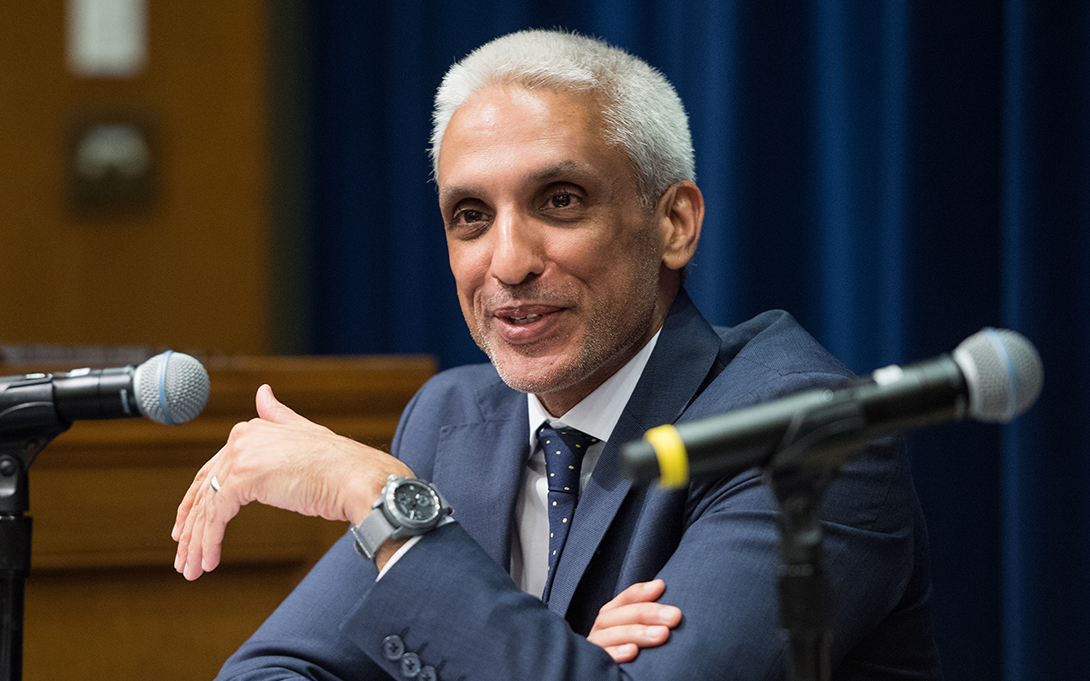
The Harry A. and Margaret D. Towsley Foundation Policymaker in Residence Program, established in 2002, pops the academic bubble in its promotion of student, faculty, and policymaker exchange by bringing individuals with significant national and international policy experience into the classroom. While on campus, the Towsley Fellows teach courses, give a lecture and often conduct research. The Fall 2019 courses taught by resident fellows Javed Ali, Hardy Vieux, Gail Wilensky, and the Honorable Sander “Sandy” Levin, will offer timely, interactive learning experiences.
“Towsley Fellows enrich our course offerings by bringing policy experts into the classroom. These special courses allow us to offer an in-depth focus on subject areas that enhance our curriculum. These experts have so much first-hand experience to draw upon, and it always proves to be a rewarding opportunity for students,” said Paula Lantz, associate dean for academic affairs.
Sandy Levin, named Distinguished Policymaker in Residence at the Ford School shortly after he announced his retirement from the U.S. House of Representatives, joined the community this winter 2019 semester. Levin brings legislating to life after having represented Southeast Michigan in Congress for over 35 years. For his first course offering, he and Susan Collins, Edward M. Gramlich Collegiate Professor of Public Policy, professor of economics, former dean of the Ford School (2007-17), will co-teach Policy Design, Strategy & Practice. This course will dive into domestic and international case examples to find the successes and challenges of such efforts. Focusing on unemployment insurance and U.S./China trade relations, the goal is to afford both undergraduate and graduates students practice in real-world policy design, with perspectives from both a long-time legislator and an economist, as well as guest speakers bringing in a further range of viewpoints.
Javed Ali, MA, JD, who previously served as senior director for counterterrorism on the National Security Council (NSC), and has additional experience at the Defense Intelligence Agency, the Department of Homeland Security, and the Federal Bureau of Investigation, returns to the Ford School to again teach students drawing upon his professional experiences in National Security Council and Counterterrorism. In the course Ali sets out to create a narrative of U.S. policy on counterterrorism pre and post the September 11, 2001 attacks. Analyzing the NSC’s history, the course explores the transformation in policy approach during this counterterrorism-focused era. Inviting in guest speakers and incorporating NSC simulation meetings where students will adopt the mindset of different key players in the organization, his background brings a real-world policy-making feel to this course.
Ali will also teach a new course with a visiting professor in the College of Engineering, Carl Landwehr, PhD, lead research scientist at the Cyber Security and Privacy Research Institute at George Washington University. This cross-listed course on Cybersecurity for Future Leaders will bring together engineering students who have a deep technical knowledge of cybersecurity and public policy students (both undergraduate and graduate) to explore the technology and policy issues facing cybersecurity prevention. The course will give deeper context to intensifying cybersecurity worries, while allowing students first-hand practice in development of effective policy in the fast-moving world of science and technology.
Hardy Vieux, JD will draw on his extensive experience in international human rights, for a graudate–level course entitled The Role of Courts in International Human Rights, exploring the legal enforcement of the human rights fundamental to all human beings. Concurrently serving as the legal director of Human Rights First, an independent advocacy and action organization that uses American influence to protect human rights worldwide, Vieux will draw upon his experiences to guide students into this complicated topic. The central inquiry of the course is what needs to be done to give legal effect to the moral norms of human rights, with a strong focus on the role of courts.
The economics of health policy will be the focus of a course taught by nationally-recognized health economist Gail Wilensky, PhD during her time as a Towsley Fellow. Her graduate-level course on Health Economics and U.S. Health Policy will cover how health care is funded and delivered, focusing on current and future challenges. A senior fellow at Project HOPE, an international health foundation, her expertise is in strategies to reform healthcare in the United States, with particular emphasis on Medicare, comparative effectiveness research, and military healthcare. Among her many professional accomplishments, Wilensky served as Deputy Assistant to President (GHW) Bush, advising him on health and welfare issues. She directed the Medicare and Medicaid programs from 1990-92 and was also the first chair of the Medicare Payment Advisory Commission. Wilensky testifies frequently before Congressional committees, serves as an advisor to members of Congress and other elected officials, speaks nationally and internationally before professional, business and consumer groups.
All graduate courses taught by Towsley Fellows are listed with the course number PubPol 750, and those also available to undergraduate students are listed as PubPol 475.
The Harry A. and Margaret D. Towsley Foundation Policymaker in Residence Program was established at the Ford School in 2002 to bring individuals with significant national and international policymaking experience to campus to interact with students and faculty. The program enhances our curriculum and strengthens our ties to the policy community.